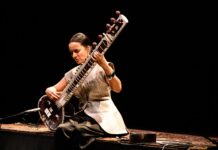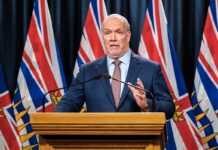
All photos by Chandra Bodalia
BY INDIRA PRAHST
Instructor of Race and Ethnic Relations
Department of Sociology
Langara College, Vancouver
THE International Day for the Elimination of Racial Discrimination, which is observed in March to collectively work towards the elimination of all forms of racism and inequalities, was commemorated last Saturday (March 21) at the annual “Stop Racism” event organized by Asian Pulse TV with Kids Play this year.
The event was officially opened with a drum ceremony and an opening prayer from well-respected Alana Anderson, originally from the Campbell River reserve and daughter of the current Hereditary Chief. She educated the audience on the meaning of the drums, prayer and symbols and gave both heart-wrenching and inspiring stories about colonial histories and the present. She reminded the audience about the struggles, loss and reclaiming of their cultural identity as a result of colonialism and their current struggles they are confronted with in Canada.

Kamilla Singh, Director and Producer of Asian Pulse TV and one of the event organizers, noted: “The reason for organizing this anti-racism event is to empower, educate and bring awareness to the community about the importance of living in a society where we all can live freely and be able to practice our religion or culture. By doing such events we become allies and voices of those who are not able to stand for themselves.”
Olympian wrestler and co-head coach of the University of the Fraser Valley wrestling team, Arjan Bhullar, spoke about being proud of his identity and the struggles of his Sikh ancestors. He said: “I hope these kids from our generation know where they come from and some may find strength in seeing me walking at the Olympic Games with a patka on. That meant a lot to me and for my people. My dream was to go in the Olympics and that moment I hope inspired many other kids to be proud of who they are, what they want to do and where they come from.”
Jodi Derkson with FAST (Fighting Anti-Semitism Together), BC Regional Director of Educational Program, showed a short clip of Holocaust survivor Max Eisen. Derkson then spoke about her experiences of being Jewish and about anti-Semitism and dispelled myths about Judaism. She said: “We put people into boxes … We accept what the media says regardless of whether or not the information passed down is incorrect.” She added that it is time for us to step outside of our comfort zone and boxes and form knowledge from truths rather than antiquated stereotypes.

Tony McAleer, Executive Director of Life After Hate, who was an organizer for the White Aryan Resistance (WAR), spoke about his experiences in the Neo-Nazi movement and the role of violence in the movement, and how youth were now being steered away from this through Life After Hate. When a student asked about why people fear others, which is often expressed in “the look,” he said: “It’s a fear of feeling lesser than [another person]. It’s not about the person. It’s internal and can be described as a toxic shame, a permanent belief that one is less than imperfect. We take different paths to cope with this. Some engage in violence and others act as the super hero. It is a fear about feeling lesser than [someone else], so a person makes himself feel better by putting others down.”
Charan Gill, founder of PICS and prominent community activist who has been involved in anti-racism movements and who had challenged the racist hate website that Mc Aleer once operated in Surrey, shared his experiences. He recounted what Neo-Nazi groups had advocated that “brown” people should be sent back home and that Aboriginal people should be sent up North and added: “So the Aryan Nations group and Skinheads would target brown people, spiting in their face, [do] all kinds of nasty stuff … The homes would be targeted with eggs and they would throw rocks at houses. We then put together an organization to fight racism.”
I also, connected to the Neo-Nazi movements, not only from my own work on the ideologies of Neo-Nazi leaders, but through a film I show in my class which features Mc Aleer’s racist hate line, “The Canadian Liberty Net,” and the rock band Oden’s Law that he managed in Surrey. I presented on the violent gaze towards the turban as a result of the sensational media representations of the current war on terror, and questioned media discourses and how this has enabled further state violence to be inflicted on the Sikh and Muslim body.

Sadia Sameeullah, activist and speaker within the Muslim and Pakistani community, addressed perceptions about Muslims and how this influences our behaviour especially in the current climate of rising Islamaphobic sentiments.
Amrik Virk, Minister of Technology, Innovation and Citizens’ Services, said: “I witnessed racism and as a young man growing up, I witnessed it against my family, my father who chose to look a certain way. That is what defined me … And to show my identity, I joined the RCMP.” (Virk was in the RCMP for 26 years.)
Virk also spoke about one of his assignments where he had to target Neo-Nazi groups. He recounted: “I was a sniper for the SWAT team for seven years and spent the night laying behind a house waiting for one man to come out. We were tasked to arrest the head of the Aryan Nations, Terry Long … for burning crosses and taking away people’s rights.” Virk was thrilled to see how Neo-Nazis can have a change of heart and mind and sit on an anti-racism panel.
Jinny Sims, NDP MP and Official Opposition Critic for Employment and Social Development, shared a few words about her experiences of racism and said: “I am glad to see a place packed with people on a Saturday to learn about the issue of racism that is very important for us as humans … When we, the people, raise our voices and say we are not going to tolerate [racism]. My inspiration are students … They can be everything and they don’t have to prove that they are Canadia. They are Canadian. … Let us provide that environment for our kids … for that kind of Canada where kids can blossom.”












